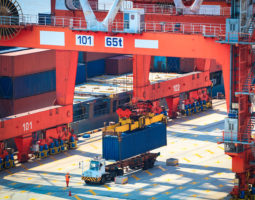Adam Hill: Biden Trade Agenda in View, Ocean Charters Offering Atypical Relief

Adam Hill, President and COO of Scarbrough Global
The logistics industry continues to find its footing as it deals with the post-pandemic normal of congestion, delays, and high costs. Scarbrough Group President and COO Adam Hill points to recent developments that may lead to a touch of stability in the chaos.
Return of Section 301 Exclusions Signal Biden Trade Intentions
The United States Trade Representative announced this month that it is reviving the Section 301 product exclusions protocol. According to Adam Hill, it’s a step in the right direction for American importers.
“I think (Section 301 exclusion) is a legitimate process for a lot of people,” Hill said. “I know they haven’t given us all of the details yet. But they’re heading down the right path and it’s a win for everybody.”
Section 301 tariffs on Chinese goods originally arrived as part of the Trump administration’s retaliation against what it deemed unfair trade practices and policy. While the majority of imports were subject to steep duties, the administration did specify a list of products eligible for exemption. Importers leveraged these exclusions until the government allowed them to expire at the end of 2020.
According to Hill, the Biden administration’s revival of Section 301 exclusions gives a clearer view of its intentions.
“This is the first time I feel that we actually have an idea of where the Biden administration is headed,” Hill said. “Getting exclusions back in place shows that the tariffs are going to be around for a while – it’s not as if a new administration will come in and some magic happens and the tariffs are gone.”
“Whether you like this current administration or the previous, the tariffs proved a point – this latest news is proof of it.”
Charter Vessels Add Another Tool to Ocean Shipping Toolbox
Hill also noted the impact that ocean charters are making on maritime shipping.
As transpacific backlogs reached historic levels earlier this year, retailers searched for alternatives. According to Hill, major importers’s moves to charter vessels independently of the steamship lines have freed up space and equipment for everyone else.
“Walmart, Costco, Target and other importers in the country are now taking their own vessels with charter deals,” Hill said. “It opens up a ton of free space compared to before.”
Charters are tapping into the potential of hundreds of smaller ports throughout the country, too. Shifting freight toward smaller facilities has taken some pressure off the major complexes outfitted to handle traditional carriers.
“They’re using smaller vessels and calling little breakbulk ports that don’t handle vessels carrying north of 15,000 TEU.”
According to Hill, these charters are likely to continue as part of ongoing supply chain strategies.
“Do I think importers will switch to 100 percent charter? No,” Hill said. “But I do think they’re going to keep charters as an extra tool on their toolbelt to handle seasonal demands.”
Adam pointed to the effects of recent power cuts on Chinese factories as yet another factor influencing maritime volumes.
“Enforced blackouts are stalling production at factories in multiple provinces,” Hill said. “While that creates delays, the silver lining is a bit of relief for outbound freight volume and vessel space.”
Adam will continue to share his thoughts and perspectives here monthly. Follow on social media or subscribe to our newsletter for regular updates.

